| Srl | Item |
| 1 |
ID:
142887
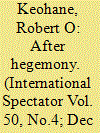

|
|
|
|
|
| Summary/Abstract |
The liberal international economic system established after the Second World War is currently in difficulty. Large fluctuations in exchange rates have led to calls for a “new Bretton Woods”. Protectionism has increased sharply on both sides of the Atlantic; the European Community, once a force for liberalization, now takes a leading role in imposing restrictions on trade. European and American discussions of the world economy are characterized less by thoughtful consideration of how joint action could relieve the current economic recession and reduce dangers of collapse, than by quarrelling over such issues as subsidies on pasta, alleged dumping of steel, and subsidized credit terms to the Soviet Union.
|
|
|
|
|
|
|
|
|
|
|
|
|
|
|
|
| 2 |
ID:
015652
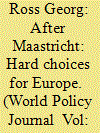

|
|
|
|
|
| Publication |
Summer 1992.
|
| Description |
487-513
|
|
|
|
|
|
|
|
|
|
|
|
|
|
|
|
| 3 |
ID:
014671
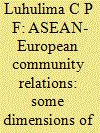

|
|
|
|
|
| Publication |
1992.
|
| Description |
309-324
|
|
|
|
|
|
|
|
|
|
|
|
|
|
|
|
| 4 |
ID:
159682
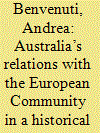

|
|
|
|
|
| Summary/Abstract |
In 2015, Australia and the European Union successfully negotiated a Framework Agreement. This agreement is an essential step in establishing a stronger Australia–European Union partnership and achieving closer bilateral cooperation. For years, negotiating such an agreement had proved impossible. In the 1970s, successive Australian governments showed interest in enhanced collaboration with the European Community, but the political climate for closer relations was far from encouraging. This article explains why this was the case. In doing so, it also explores how the Whitlam and Fraser governments envisaged, framed and developed Australia’s ties with the European Community in the 1970s, and asks whether a more positive approach on their part could have led to a stronger relationship. Based on recently declassified government files, this article shows that although both Whitlam and Fraser fully grasped the importance of the European Community as an emerging international actor and were willing to deepen Australia’s ties with it, significant constraints existed against enhanced bilateral cooperation. With the Common Agricultural Policy still a considerable challenge to Australian economic interests and with the European Community focused mainly on the management of its internal market, broader political considerations were inevitably relegated to the margins of Australia–European Community consultations.
|
|
|
|
|
|
|
|
|
|
|
|
|
|
|
|
| 5 |
ID:
015007
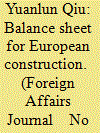

|
|
|
|
|
| Publication |
Dec 1992.
|
| Description |
11-19
|
|
|
|
|
|
|
|
|
|
|
|
|
|
|
|
| 6 |
ID:
022725
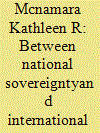

|
|
|
|
|
| Publication |
Oct 2002.
|
| Description |
849-868
|
|
|
|
|
|
|
|
|
|
|
|
|
|
|
|
| 7 |
ID:
058275
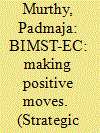

|
|
|
| 8 |
ID:
142273
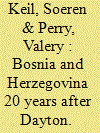

|
|
|
|
|
| Summary/Abstract |
It has been 20 years since the Dayton Peace Agreement (DPA, official name: General Framework Agreement for Peace in Bosnia and Herzegovina) ended the bloodiest war in Europe since World War II. The violent conflict and the peace agreement demonstrated many of the tectonic changes that Europe and the world as a whole went through after the end of the Cold War. First, the wars highlighted the inability of the European Community (after 1993 European Union (EU)) to end the conflict, because of its Member States' disagreement on strategies and options, including the threat of military intervention, and the brilliant recognition and manipulation of this wavering by Balkan leaders. Reflecting this European discord, the DPA secondly highlighted the importance of the United States as the only remaining superpower capable of decisively intervening to end the violence in Southeastern Europe. The perception of a weak EU and a strong US willing to use military force would be further strengthened when NATO, significantly led by the US, intervened in the Kosovo war in 1999. Third, the war, and the consequent peace agreement also highlighted that the end of the Cold War by no means resulted in an end of violent conflict in Europe and beyond. Francis Fukuyama's thesis of the “End of History” and the victory of capitalism and democracy proved to be wrong, shortly after it was formulated. Finally, the war in Bosnia and the resulting peace agreement raised new discussions about the drivers of political violence and conflict, the role of ethnicity in democratic systems and institutional options available to overcome such wars and build and consolidate democracies.
|
|
|
|
|
|
|
|
|
|
|
|
|
|
|
|
| 9 |
ID:
025013
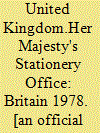

|
|
|
|
|
| Publication |
London, Her Majerty's Stationery Office, 1978.
|
| Description |
ix, 488p.Hbk
|
| Standard Number |
0117009253
|
|
|
|
|
|
|
|
|
|
|
|
Copies: C:1/I:0,R:0,Q:0
Circulation
| Accession# | Call# | Current Location | Status | Policy | Location |
| 017630 | 941.032/UNI 017630 | Main | On Shelf | General | |
|
|
|
|
| 10 |
ID:
036514
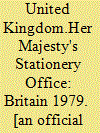

|
|
|
|
|
| Publication |
London, Her Majesty's Stationary Office, 1979.
|
| Description |
ix, 490p.Hbk
|
| Standard Number |
0117009717
|
|
|
|
|
|
|
|
|
|
|
|
Copies: C:1/I:0,R:0,Q:0
Circulation
| Accession# | Call# | Current Location | Status | Policy | Location |
| 018060 | 941.032/UNI 018060 | Main | On Shelf | General | |
|
|
|
|
| 11 |
ID:
117356
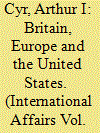

|
|
|
|
|
| Publication |
2012.
|
| Summary/Abstract |
A useful analytic distinction between structural and policy differences was made by Henry Kissinger; the former must be accommodated while the latter may be resolved. There is no shortage of tensions and disagreements between the United States and the nations of Europe. Likewise, the bilateral alliance between Britain and the US has been defined in part by disagreements. Even during the Second World War, when the relationship was redefined in modern terms, there were strong conflicts despite the extraordinary incentives for cooperation.
From the start, a key strength of the Anglo-American alliance was emphasis on institutional structures for the long term, viewed as a complement to the essential immediate cooperation in fighting and ultimately defeating the Axis powers. The insight of Jean Monnet and others in employing economic tools for political and diplomatic ends has proven essential. The fortieth anniversary of Britain's entry into the European Community is a useful benchmark for retrospective analysis. For the US, the twin commitments of an active international role and unification of Europe around economic matters has been remarkably consistent. As John Mearsheimer has argued, the end of the Cold War removed fundamental incentives for cooperation. Nonetheless, institutional structures of both the EU and NATO have survived.
Britain traditionally has been reluctant to engage in continuous institutional engagement with Europe, beyond the requirements of military alliances helpful or essential to national security. The lengthy uneven character of the road to membership in Europe's economic institutions reflects this fundamental attitude. Currently, Britain's ambiguous role of participation in European institutions but not in the euro may in fact facilitate transatlantic cooperation, and illustrates the usefulness of Kissinger's point. The fading of militarism in Europe since 1945 is a fundamental accomplishment, often overlooked in contemporary economic debate.
|
|
|
|
|
|
|
|
|
|
|
|
|
|
|
|
| 12 |
ID:
004626
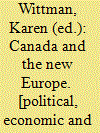

|
|
|
|
|
| Publication |
Manitoba, Centre for Defence and Security Studies, 1993.
|
| Description |
xvii,191p.
|
| Series |
Occasional Paper;21
|
|
|
|
|
|
|
|
|
|
|
|
Copies: C:1/I:0,R:0,Q:0
Circulation
| Accession# | Call# | Current Location | Status | Policy | Location |
| 035528 | 327.7104/WIT 035528 | Main | On Shelf | General | |
|
|
|
|
| 13 |
ID:
025387
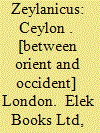

|
|
|
|
|
| Publication |
London, Elek books Ltd, 1970.
|
| Description |
288p.hbk
|
| Standard Number |
236176579
|
|
|
|
|
|
|
|
|
|
|
|
Copies: C:1/I:0,R:0,Q:0
Circulation
| Accession# | Call# | Current Location | Status | Policy | Location |
| 005762 | 954.93/ZEY 005762 | Main | On Shelf | General | |
|
|
|
|
| 14 |
ID:
014308
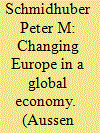

|
|
|
|
|
| Publication |
1992.
|
| Description |
211-219
|
|
|
|
|
|
|
|
|
|
|
|
|
|
|
|
| 15 |
ID:
011388
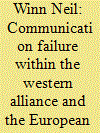

|
|
|
|
|
| Publication |
Auttumn 1996.
|
| Description |
139-148
|
|
|
|
|
|
|
|
|
|
|
|
|
|
|
|
| 16 |
ID:
016714
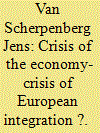

|
|
|
|
|
| Publication |
1993.
|
| Description |
315-325
|
|
|
|
|
|
|
|
|
|
|
|
|
|
|
|
| 17 |
ID:
120420
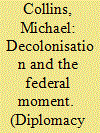

|
|
|
|
|
| Publication |
2013.
|
| Summary/Abstract |
Post-1945 decolonisation involved the universal acceptance of nation-statehood as the alternative to imperialism. Nationalism vanquished its transnational competitors, notably imperialism and Marxism. Alternatives to imperial rule that avoided sovereign states on national lines, such as federations in the later 1940s and 1950s, have received less attention from historians. Federations involved alternative ways of thinking about sovereignty, territoriality, and political economy. British interest in creating federations, for example the Central African Federation (CAF) in 1953, offers some new perspectives on the strength of imperial ideology and the determination to continue a missionary imperialism after the Second World War. Federal thinking and practice was prominent at this time in other European empires too, notably the French and Dutch ones. The federal idea was also an aspect of the emerging European community. This is suggestive of a wider "federal moment" that points to the importance of linking international, trans-national, imperial, and world historical approaches.
|
|
|
|
|
|
|
|
|
|
|
|
|
|
|
|
| 18 |
ID:
109493
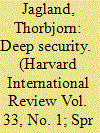

|
|
|
| 19 |
ID:
123245
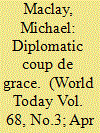

|
|
|
| 20 |
ID:
014138
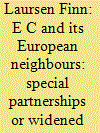

|
|
|
|
|
| Publication |
Winter 1991-92.
|
| Description |
29-63
|
|
|
|
|
|
|
|
|
|
|
|
|
|
|
|